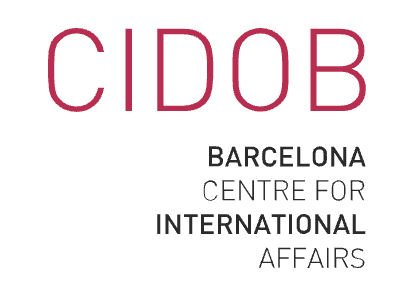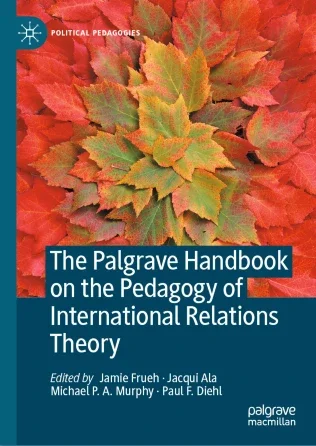research
environmental governance publications
Global Environmental Politics Journal logo
Devon Cantwell-Chavez, Emma Lecavalier, Marielle Papin, Dhanasree Jayaram, Thais Ribeiro, Janina Grabs, Justin Alger. “Supporting the Next Generation of Global Environmental Politics Research: A Call to Dialogue and Action.” Accepted at Global Environmental Politics.
Abstract:
The success of Global Environmental Politics throughout the last quarter century has depended on the insights of and contributions from early career researchers (ECRs). As the journal reflects on the past twenty-five years and looks forward, taking stock of ECR perspectives is a critical exercise for ensuring that the journal and the field of global environmental politics (GEP) remain healthy and productive. In this article, we incorporate insights generated through focus groups and surveys from 51 ECRs from around the world to explore: (1) where ECRs think GEP is headed; (2) ECRs visions and hopes for the future of GEP research; and (3) what structural components (training, job market, disciplinary organizations) are necessary to support ECRs in producing the next generation of environmental politics research. Exploring these questions, we propose a start to a “Next Generation Research Strategy,” focused on how GEP scholars should be researching empirical topics. We conclude by addressing the challenges ECRs face in implementing this strategy and how institutions—including associations, journals, and training programs—can support ECRs in this endeavor.
Marielle Papin and Devon Cantwell-Chavez. Forthcoming Autumn 2025. Funding models of city networks and their ecosystem of partners. The evolution of city diplomacy amidst geopolitical tensions, the crisis of multilateralism, and the rising global South. CIDOB Monograph Series. CIDOB (Barcelona Centre for International Affairs).
Abstract:
This chapter focuses on the relationship between financing of transnational city networks and network governance. We argue that funding is not only about how an organization works on its own and what it can achieve with the resources it has, but it is also about who gives money to and who exerts power over that organization. We introduce a new, tri-dimensional typology of transnational city network financing models and apply this typology to three case studies: UCLG, C40, and Mayors Migration Council. From this, we generate five insights. First, networks have a wide variety of funders. Second, a lack of structural or core funding affects the capacity of networks to fulfill their missions. Third, many factors influence networks’ financing models, including funders. Fourth, the increasing involvement of private actors in the ecosystem of transnational city networks still has unclear effects. Fifth, there remains information opaqueness in financing of transnational city networks.
Devon Cantwell-Chavez. Forthcoming 2025. Phil Orchard, Antje Wiener, and Sassan Gholiagha (editors). Whose Norms Matter? Challenging Power in Global Climate Governance. Oxford Handbook on Norms Research in International Relations. Oxford University Press.
Benney, Tabitha M., Devon Cantwell-Chavez, Phillip Singer, Linda Derhak, Samuel Bey, and Zahra Saifee. 2021. "Understanding Perceptions of Health Risk and Behavioral Responses to Air Pollution in the State of Utah (USA)" Atmosphere 12, no. 11: 1373. https://doi.org/10.3390/atmos12111373
Abstract:
Poor air quality in Utah creates an array of economic, environmental, and health-related impacts that merit investigation and informed political responses. Air pollution is known to cause a variety of health problems, ranging from increased rates of asthma to cardiovascular and lung disease. Our research investigates the extent of Utahn’s understanding of the health risks associated with long-term and short-term impacts of air quality. To assess the degree to which Utahn’s perceive the health risks of air pollution, we performed an ordinal logistic regression analysis using responses to the Utah Air Quality Risk and Behavioral Action Survey, a representative panel survey administered between November 2018 and January 2020 (n = 1160), to determine how socioeconomic status impacts risk perception. Socioeconomic status is not a predictor of perceiving air’s short-term risks to health. Those with more conservative political orientation, as well as those with higher religiosity scores, were less likely than those with more liberal political orientation or those with lower religiosity scores to strongly agree that air pollution poses short-term health risks. We find that for short-term health risks from air pollution, Utahns in the middle-income category are more likely than those in the low-income category to strongly agree that air pollution poses long-term health risks. In addition, those with more conservative political orientation were less likely than those with more liberal political orientation to strongly agree that air pollution poses long-term health risks.
Tabitha Benney, Amandine Orsini, Devon Cantwell-Chavez, and Laura Iozzelli, Chapter 3: Theories and Methods of Agency Research in ESG (2020), in Michele Betsill, Tabitha M. Benney and Andrea K. Gerlak (editors), Understanding Agency in Earth System Governance. New York, NY: Cambridge University Press.
PEDAGOGY, MENTORING, AND TEACHING PUBLICATIONS
Devon Cantwell-Chavez and Melissa Baker. 2024. Misbah Hyder and Michael Murphy (editors). Building and Maintaining Peer Learning Communities for Early Career Instructors. Palgrave Macmillan. Teaching Political Science and International Relations for Early Career Instructors.
Abstract:
The landscape of teaching in political science has dramatically transformed over the past decade due to increasingly diversifying campuses, COVID learning interruption, and emerging classroom technology. While more political science graduate programs are offering pedagogical training, these courses are often one-off classes covering the basics of teaching and learning. Rarely are graduate students able to study or train on cutting-edge dilemmas or issues in the classroom. In response to this unfilled need, one of the chapter coauthors co-founded the Western Political Science Association Inclusive Pedagogy and Teaching Virtual Community (WPSA ITVC). Since 2020, the community has been led by a majority of early career instructors (ECIs) and has held over two dozen events on topics related to increasing classroom accessibility and inclusivity, including workshops on trauma-informed education, Universal Design for Learning (UDL), generative AI, writing feedback, and preparing for the job market. In this chapter, we reflect on our position as co-chairs of the WPSA ITVC on the process of creating and supporting a learning community for ECIs as ECIs. We argue that peer-learning communities such as this enhance disciplinary collaboration on teaching and learning, close gaps in the accessibility of instructional training, and break down traditional hierarchies in the space of teaching and learning.
Devon Cantwell-Chavez and Jourdan Davis. 2024. “Navigating Generative AI Tools in the Classroom Through a Lens of Equity and Accessibility.” Journal of Political Science Education, November, 1–13. doi:10.1080/15512169.2024.2426153.
Abstract:
The open release of ChatGPT in late 2022 sent the world of education into a frenzy. Popular media outlets both sang the praises of generative AI and also posed questions about what generative AI meant for the future of teaching and learning. In the year that has followed, we have seen a broad range of strategies for managing generative AI on campuses ranging from total bans to open embrace and encouragement. As such, many instructors feel lost and unguided in how to approach generative AI in their classrooms. In response to lack of clarity on direction or alternatives, an increasing number of administrators and instructors are considering bans on generative AI tools. In this article, we offer a set of considerations about the landscape of generative AI in classroom and work settings followed by a set of three models (high, medium, and low use) instructors can use in small, medium, and large classrooms to navigate AI in a higher education setting.
Ryan Katz-Rosene and Devon Cantwell-Chavez. 2025. Teaching Environment in an IR Theory Course. Jamie Frueh, Jacqui Ala. Michael Murphy, Paul Diehl (editors). Palgrave Handbook on the Pedagogy of International Relations Theory
Abstract:
In this chapter Katz-Rosene and Cantwell-Chavez explore the integration of environmental themes into an introductory International Relations (IR) theory course. They highlight the increasing importance of environmental breakdown in global politics and its relevance to university students, and discuss the absence of any singular dominant environmental theory within IR. The authors offer guidance on how to cover key environmental topics associated with what they call the global “habitability crisis”, such as climate change, biodiversity decline, ecosystem degradation, particularly through the gaze of global environmental governance. They conclude the chapter with reflections on teaching different environmental theoretical camps within IR, emphasizing the value of critical analyses in understanding global environmental challenges.
Devon Cantwell-Chavez, Asif Siddiqui, and Christina Fattore. September 2022. Discrimination and Sexual Assault- Resources and Options for Responding and Reporting, Kevin Lorentz II, Daniel Mallinson, Julia Hellwege, Davin Phoenix, J. Cherie Strachan (editors). Strategies for Navigating Graduate School and Beyond.
Devon Cantwell-Chavez, Siobhan Kirkland, Hannah Lebovits, Maricruz Osorio, Natalie Rojas, Rosalie Rubio, Sarah Shugars, Rachel Torres, and Rachel Winter. September 2022. No Rapunzel in This Ivory Tower: Finding Your Collective and Overcoming Academic Isolation, Kevin Lorentz II, Daniel Mallinson, Julia Hellwege, Davin Phoenix, J. Cherie Strachan (editors). Strategies for Navigating Graduate School and Beyond
Devon Cantwell-Chavez and Alisson Rowland. September 2022. Hidden Expenses in Graduate School: Navigating Financial Precarity and Elitism, Kevin Lorentz II, Daniel Mallinson, Julia Hellwege, Davin Phoenix, J. Cherie Strachan (editors). Strategies for Navigating Graduate School and Beyond.
The cover of “Strategies for Navigating Graduate School and Beyond”
Misbah Hyder, Dana El Kurd, Felicity Gray, Devon Cantwell-Chavez, and Alisson Rowland. September 2022. Things that Can Go “Wrong”: Finding Our Own Way in Graduate School, Kevin Lorentz II, Daniel Mallinson, Julia Hellwege, Davin Phoenix, J. Cherie Strachan (editors). Strategies for Navigating Graduate School and Beyond.
A stack of books with an apple and a stack of blocks next it on a desk
Julie Rust & Devon Cantwell-Chavez (2018). No one fits in a box: Preservice teachers’ evolving perceptions of self and others. Contemporary Issues in Technology and Teacher Education, 18(2).












